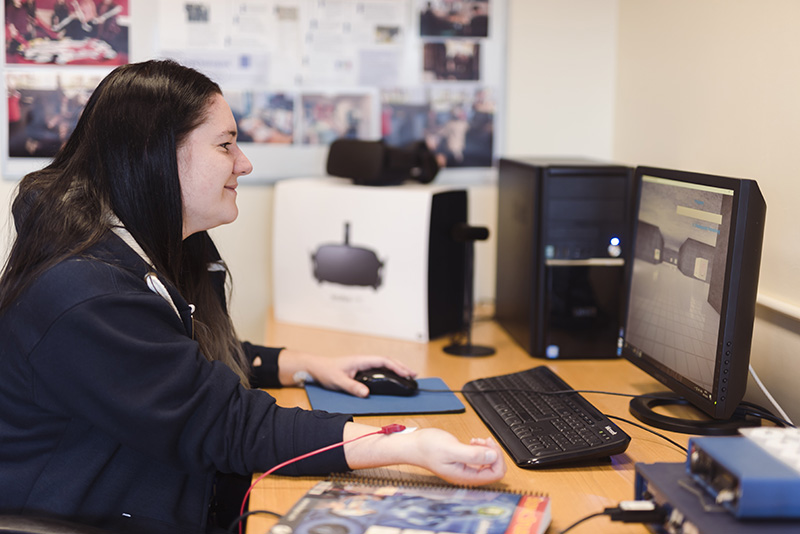MSc Applied Psychology

Course details
Year of entry
2026
Duration
1 YRS (FT) 2 YRS (PT)
Institution Code
G53
Location
Wrexham
Why choose this course?
The MSc Applied Psychology course allows you to further your knowledge of psychological theory, research, and professional practice. With your supervisor, you will also be able to plan and carry out your own research project.
The course:
- Allows you to develop your own research project in line with your interests.
- Provides you with theoretical knowledge relating to different applied psychology professions.
- Teaches through a range of methods, including lectures, seminars, and workshops.
- Is coursework based and you are assessed through a range of different methods to enhance your skills across a range of areas.
- Is focused on developing professional skills, through the professional development module allowing you to develop your knowledge of working in an applied psychology setting.
- Will further develop your knowledge of research within applied psychology.
- Consists of a teaching team who have a varied area of expertise in the psychology field.
Key course features
- Modules focused on different Applied Psychology professions.
- The opportunity to develop both theoretical knowledge and research skills.
- The opportunity to take part in our Enrichment Week with students from our undergraduate and postgraduate programmes.
- Encouragement to develop your own research idea for your research project, working alongside your supervisor/s.
What you will study
Applied research methods - This module aims to provide you with the knowledge and confidence to approach, quantitative and qualitative analyses in the context of applied research methods at an advanced level. The module will provide you with an overview of historical and philosophical issues within psychology with particular focus on issues related to applied research. You will develop knowledge and understanding of advanced approaches to quantitative and qualitative analysis appropriate for applied research. The module will enable you to appraise evidence, develop research designs and discuss practical issues in a variety of research contexts. You will develop a critical understanding of ethics and research conduct and will gain an appreciation for current debates in research.
Therapeutic approaches - This module will increase your understanding and knowledge of the philosophical underpinnings and theoretical underpinnings of a variety of therapeutic approaches. The module will also familiarise you with different therapeutic practices in various models of therapy. You will also develop increased insight into the complexity, benefits, and challenges of therapeutic practice.
Psychopathology across the lifespan - during this module you will develop your understanding of psychological, behavioural, neurological, and developmental disorders which may present during different stages throughout the lifespan. You will also be encouraged to critique the nature of psychopathology and how it is approached and managed by clinicians. This module will also enable you to critique the role of social, cultural, and economic factors within development and management of different psychological disorders/conditions.
Contextual and contemporary practice - This module will develop your understanding of different applied psychological professions, including the ways in which they are similar and distinct from one another. You will also gain an understanding of the evolution and development of these professions from their inception to contemporary practice. The module will also revisit classic psychological theory and approaches (such as psychodynamic, person-centred, cognitive-behavioural, the biomedical model) and how they may have impacted upon different applied professions. You will be encouraged to think about how practice may continue to evolve and consider what underpinnings will be relevant to different applied professions within the future.
Professional development - this module will focus on your professional development and enhancing employability within applied psychology and/or research sectors. You will explore and develop strategies for analysing and evaluating experience in a practical setting and gain insight into expectations regarding professional ethics and behaviour. Further to this, you will develop practice of continuing professional development and lifelong learning.
Assessments in psychological practice - This module is intended to provide you with an overview of psychology assessments within applied settings. You will be introduced to a range of methods for collecting information within applied psychology settings. The module will equip you with knowledge of the theoretical underpinnings of assessment, different functions, and ethical considerations. You will also consider how different assessment may inform clinical practice, and research, within applied psychology professions.
Research project - This module aims to enable you to make an original contribution to the field of relevant psychology by designing, undertaking, and reporting (both written and oral) on a piece of research. The aim is to develop your research skills and report writing skills along with a level of expertise in their chosen area of investigation.
Entry requirements & applying
Applicants will need to have completed and passed a undergraduate degree in Psychology. at a minimum of a 2.1 grade
Ideally, applicants will have at least a 2:1, although students with a 2:2 will also be considered where there is evidence of extensive relevant experience.
Teaching & Assessment
Lectures - you will have both in-person and pre-recorded lectures during the MSc Applied Psychology to develop your knowledge and understanding of the subject area.
Seminars - you will also have seminars for your taught modules to further consolidate your knowledge and understanding. This will include class discussion and engaging with materials prior to sessions (such as online lectures, or specific resources such as journal articles). Depending on numbers on the programme, seminars may take place in smaller groups than the cohort has in total, to allow for discussion.
Workshops - you may engage with workshops to further support your subject-specific and practical skills. This may involve working in the Psychology lab, or utilising computer-based software to enable you to further develop your analysis skills. This will also enable you to enhance your knowledge of psychometric tests and assessments in applied psychology.
Guided independent study - you will be guided to take part in further reading for your modules, along with being given formative tasks to complete to enhance your knowledge and understanding, along with developing your professional skills by allowing you to work independently. You may also be asked to complete tasks in small groups, but independent of your lecturer to enhance your group-work.
Work-experience element - as part of the professional development module, you will be required to complete work-experience within a related field. This could be academic, research, or applied in focus. This will allow you to reflect on your experience, improving your professional, practical, and employability skills.
Assessments - the programme adopts a range of assessment methods to ensure you improve your skills in different areas. Written assignments may take the form of essays, literature reviews, reflections, and critical appraisals which develop your intellectual skills. Presentations are also used to develop your ability to disseminate information to a wide range of audiences. Portfolios allow you to complete small pieces of work throughout the module which will develop into a complete portfolio of work.
Career prospects
Our Careers & Employability service is there to help you make decisions and plan the next steps towards a bright future. From finding work or further study to working out your interests, skills and aspirations, they can provide you with the expert information, advice and guidance you need.
This course would be ideal for support roles within applied psychology (such as assistant psychologists).
Fees & funding
You do not have to pay your tuition fees upfront.
The fees you pay and the support available will depend on a number of different factors. Full information can be found on our fees & finance pages. You will also find information about what your fees include in the fee FAQs.
All fees are subject to any changes in government policy, view our postgraduate fees.
International
This course is open to international students, for information about the university’s entry requirements for EU/international students, please visit our international section.


